Unit 12What did you do last weekend Section A 1a-1c 课件+音频(共35张PPT) 人教版英语七年级下册
文档属性
| 名称 | Unit 12What did you do last weekend Section A 1a-1c 课件+音频(共35张PPT) 人教版英语七年级下册 |
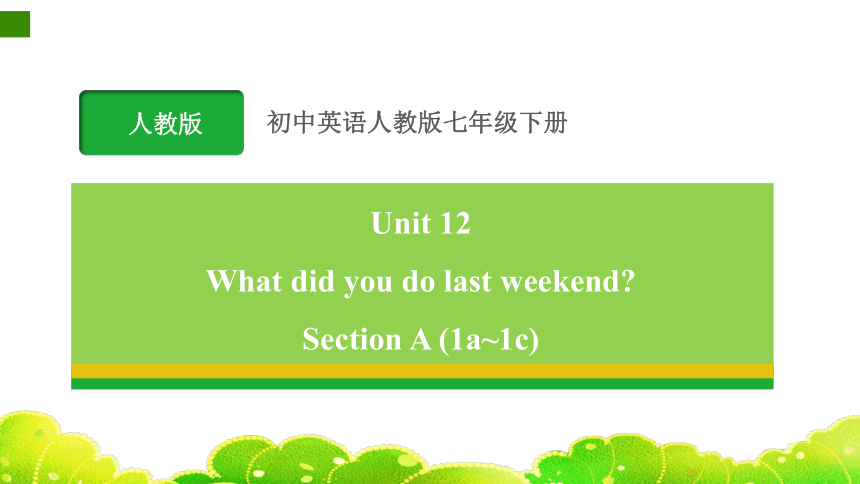
|
|
| 格式 | pptx | ||
| 文件大小 | 9.8MB | ||
| 资源类型 | 教案 | ||
| 版本资源 | 人教新目标(Go for it)版 | ||
| 科目 | 英语 | ||
| 更新时间 | 2024-01-01 19:43:37 | ||
图片预览

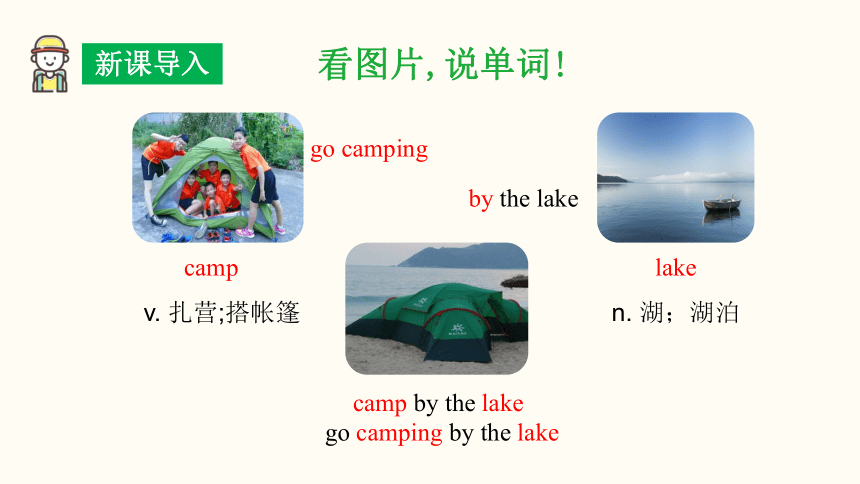

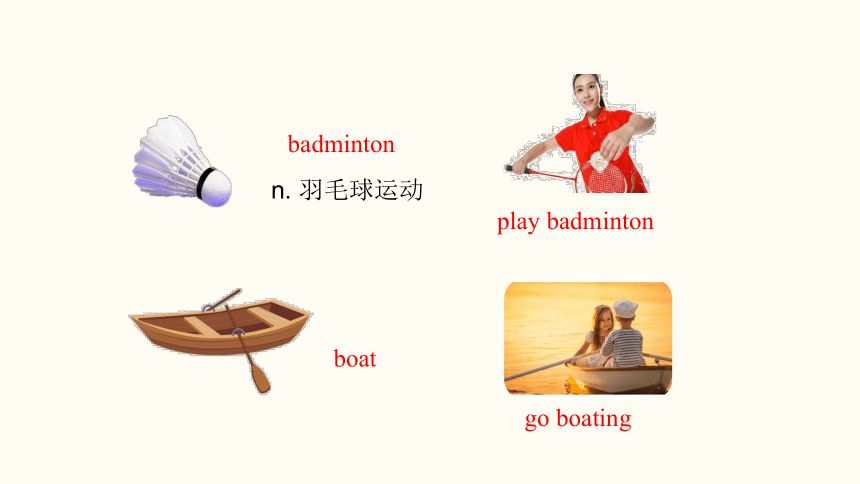
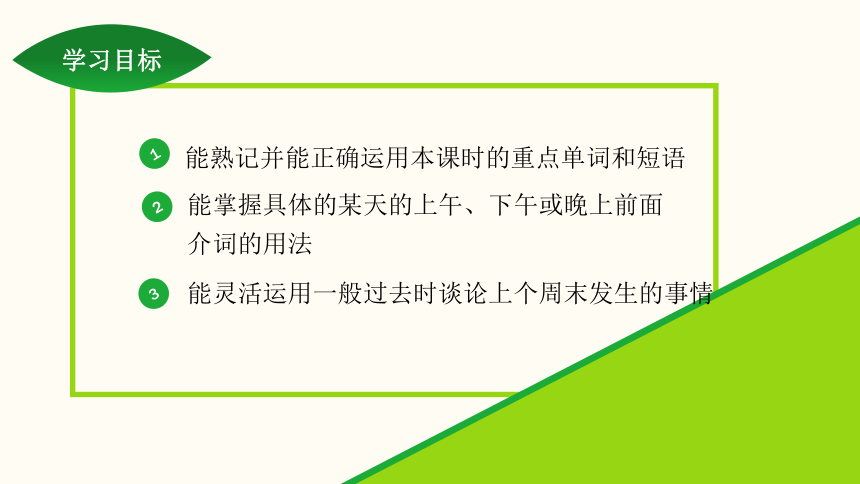
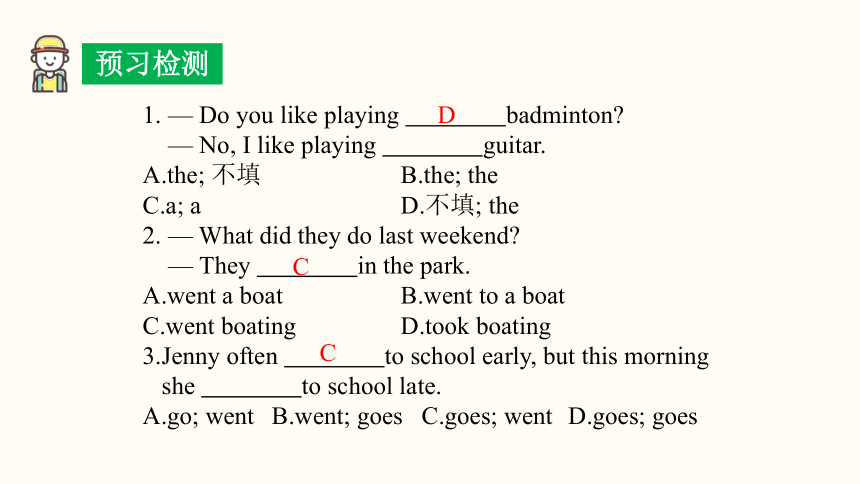
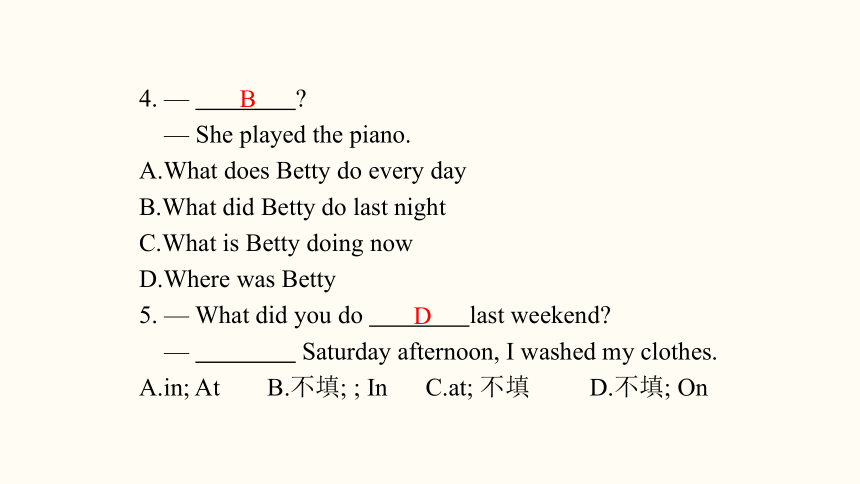
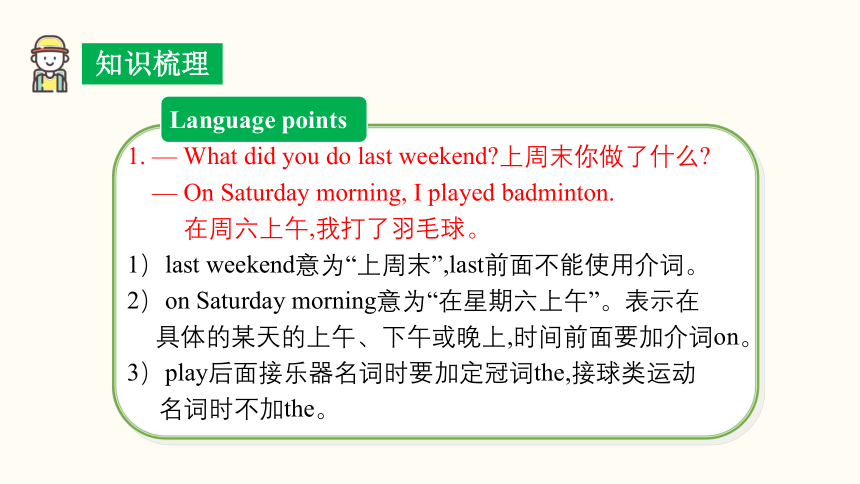
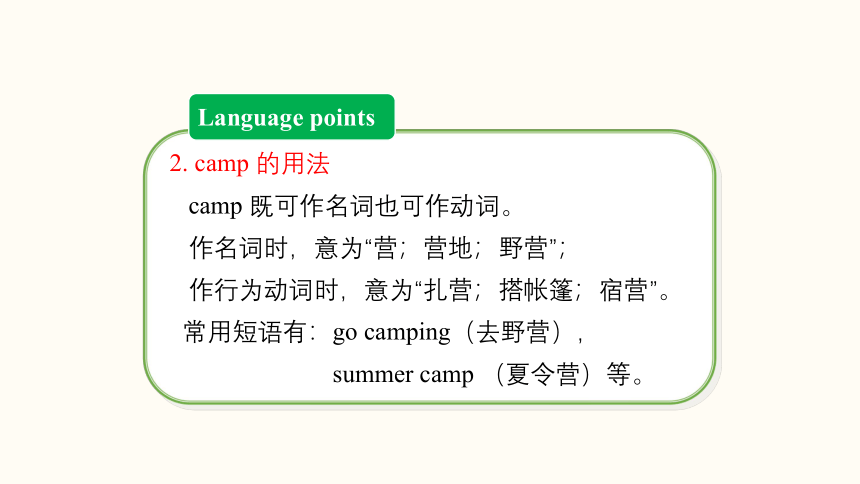

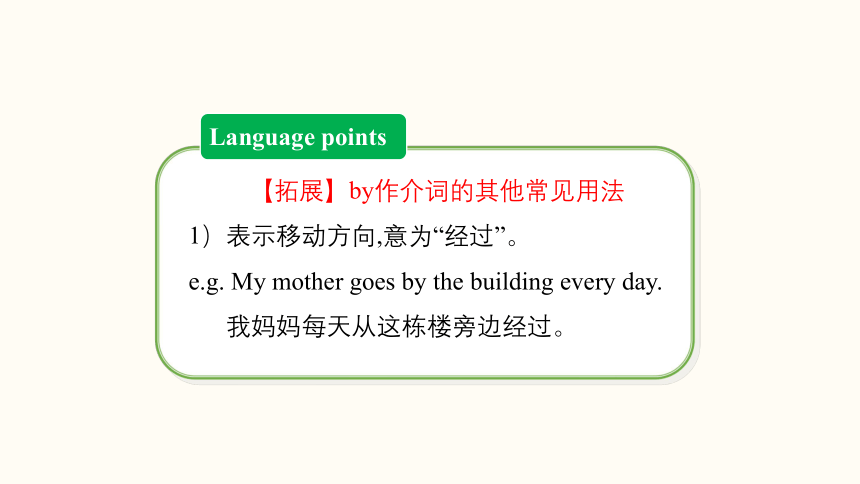
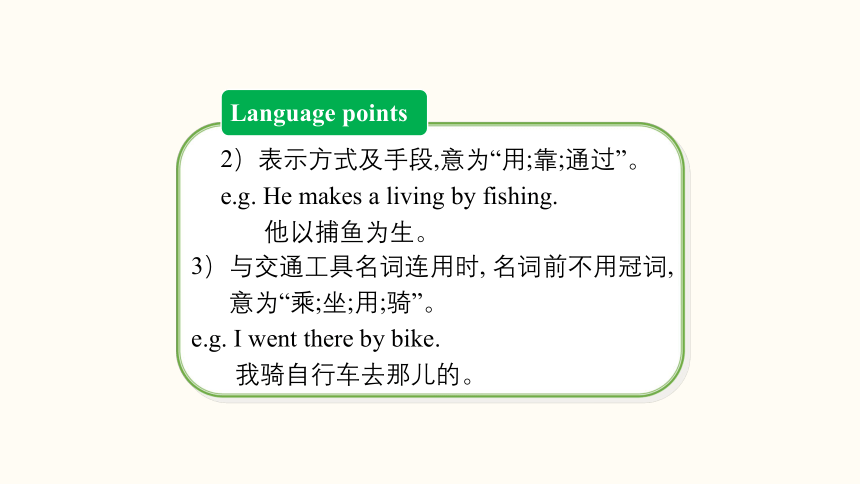
文档简介
(共35张PPT)
Unit 12
What did you do last weekend
Section A (1a~1c)
新课导入
看图片,说单词!
lake
camp
go camping
by the lake
camp by the lake
go camping by the lake
v. 扎营;搭帐篷
n. 湖;湖泊
beach
go to the beach
on the beach
badminton
play badminton
n. 羽毛球运动
boat
go boating
1
2
能熟记并能正确运用本课时的重点单词和短语
能灵活运用一般过去时谈论上个周末发生的事情
3
能掌握具体的某天的上午、下午或晚上前面
介词的用法
预习检测
1. — Do you like playing badminton
— No, I like playing guitar.
A.the; 不填 B.the; the
C.a; a D.不填; the
2. — What did they do last weekend
— They in the park.
A.went a boat B.went to a boat
C.went boating D.took boating
3.Jenny often to school early, but this morning
she to school late.
A.go; went B.went; goes C.goes; went D.goes; goes
D
C
C
4. —
— She played the piano.
A.What does Betty do every day
B.What did Betty do last night
C.What is Betty doing now
D.Where was Betty
5. — What did you do last weekend
— Saturday afternoon, I washed my clothes.
A.in; At B.不填; ; In C.at; 不填 D.不填; On
D
B
知识梳理
Language points
1. — What did you do last weekend 上周末你做了什么
— On Saturday morning, I played badminton.
在周六上午,我打了羽毛球。
1)last weekend意为“上周末”,last前面不能使用介词。
2)on Saturday morning意为“在星期六上午”。表示在
具体的某天的上午、下午或晚上,时间前面要加介词on。
3)play后面接乐器名词时要加定冠词the,接球类运动
名词时不加the。
Language points
2. camp 的用法
camp 既可作名词也可作动词。
作名词时,意为“营;营地;野营”;
作行为动词时,意为“扎营;搭帐篷;宿营”。
常用短语有:go camping(去野营),
summer camp (夏令营)等。
Language points
3. by 的用法
意为“在……旁边”, 表示位置, 相当于beside。
e.g. Our teacher is sitting by the window.
我们老师正坐在窗户旁边。
Language points
【拓展】by作介词的其他常见用法
1)表示移动方向,意为“经过”。
e.g. My mother goes by the building every day.
我妈妈每天从这栋楼旁边经过。
Language points
2)表示方式及手段,意为“用;靠;通过”。
e.g. He makes a living by fishing.
他以捕鱼为生。
3)与交通工具名词连用时, 名词前不用冠词,
意为“乘;坐;用;骑”。
e.g. I went there by bike.
我骑自行车去那儿的。
探究一
谈论周末活动
Guessing
What did he do last weekend
He played badminton.
He went boating.
She did her homework.
What did she do last weekend
She went to the beach.
1a Match the activities with the pictures [a-f].
1. did my homework ____
2. went to the cinema ____
3. went boating ______
4. camped by the lake ___
5. went to the beach _____
6. played badminton ____
a
d
e
f
b
c
went boating
played badminton
2
3
4
5
6
did my homework
camped by the lake
went to the beach
went to the cinema
What did he/she/they/you do
1
Pair work
1b Listen and write the day, morning, afternoon or
night below each picture.
a. Sunday ____________
b. Saturday ____________
c. Saturday ____________
d. ____________ night
e. Sunday ____________
f. ____________ morning
night
afternoon
morning
Saturday
afternoon
Sunday
Pair work
1c Role-play. Student A is Lucy. Student B
asks Lucy about her weekend.
What did you do last weekend, Lucy
Well, on Saturday morning, I played soccer.
Well, on Saturday morning, I played badminton.
I went to the beach.
What did you do last weekend, Lucy
What did you do on Saturday afternoon
I went boating with my friends.
I went to a movie.
What did you do on Saturday night
What did you do on Sunday morning
I camped by the lake.
What did you do on Sunday afternoon
What about Sunday night
I did my homework at home.
当堂检测见DCF课件
活动小结
通过以上的活动,我们学习了一些过去式的短语,比如:去电影院________________,去沙滩_______________,打羽毛球________________
went to the cinema
went to the beach
played badminton
探究二
具体的某天的上午、下午
或晚上前面介词的用法
What did you do last weekend
On Saturday morning,
I camped by the lake.
Free talk
Free talk
What did you do last weekend
On Saturday afternoon,
I played badminton.
What did you do last weekend
On Saturday night,
I did my homework.
Free talk
What did you do last weekend
On Sunday morning,
I went to the beach.
Free talk
What did you do last weekend
On Sunday afternoon,
I went boating.
Free talk
What did you do last weekend
On Sunday night,
I went to the cinema.
Free talk
Last weekend, I was very busy.
On Saturday morning,
On Saturday afternoon,
On Saturday night,
On Sunday morning,
On Sunday afternoon,
On Sunday night,
camped by the lake.
went to the beach.
went to the cinema.
went boating.
did my homework.
played badminton.
On..., I...
Group work
On Saturday morning,
On Saturday afternoon,
On Saturday night,
On Sunday morning,
On Sunday afternoon,
On Sunday night,
具体某天的上午、下午或晚上
Saturday morning,
Saturday afternoon,
Saturday night,
Sunday morning,
Sunday afternoon,
Sunday night,
观察短语并在小组内讨论其用法和区别,总结规律
单独表示某天的上午、下午或晚上
表示具体某天的上午、下午或晚上与单独表示上午、下午或晚上的短语相比,多了介词on。因此,需要表示具体的某天的上午、下午或晚上,时间前面要加介词。
当堂检测见DCF课件
活动小结
通过以上的活动,我们可以知道,on Saturday morning意为1._____________,表示在具体的某天的上午、下午或晚上,时间前面要加介词2.______。
在星期六上午
on
当堂检测
一、填入动词短语(动词用一般过去式)。
1. 在湖边扎帐篷 __________________
2. 打羽毛球 __________________
3. 去海边 __________________
4. 去划船 __________________
5. 去电影院 __________________
camped by the lake
played badminton
went to the beach
went boating
went to the cinema
1. Mike (go) boating with his friends last Sunday.
2. Anna (study) for the math test last Saturday.
3. John and his classmates (camp) by the lake last weekend and they (have) a good time there.
4. — Did you (see) pandas in the zoo yesterday
— No, I .
went
studied
camped
had
see
didn’t
二、用所给动词的适当形式填空。
课堂总结
谈论周末活动
具体的某天的上午、下午或晚上前面介词的用法
Unit 12
Section A (1a~1c)
Unit 12
What did you do last weekend
Section A (1a~1c)
新课导入
看图片,说单词!
lake
camp
go camping
by the lake
camp by the lake
go camping by the lake
v. 扎营;搭帐篷
n. 湖;湖泊
beach
go to the beach
on the beach
badminton
play badminton
n. 羽毛球运动
boat
go boating
1
2
能熟记并能正确运用本课时的重点单词和短语
能灵活运用一般过去时谈论上个周末发生的事情
3
能掌握具体的某天的上午、下午或晚上前面
介词的用法
预习检测
1. — Do you like playing badminton
— No, I like playing guitar.
A.the; 不填 B.the; the
C.a; a D.不填; the
2. — What did they do last weekend
— They in the park.
A.went a boat B.went to a boat
C.went boating D.took boating
3.Jenny often to school early, but this morning
she to school late.
A.go; went B.went; goes C.goes; went D.goes; goes
D
C
C
4. —
— She played the piano.
A.What does Betty do every day
B.What did Betty do last night
C.What is Betty doing now
D.Where was Betty
5. — What did you do last weekend
— Saturday afternoon, I washed my clothes.
A.in; At B.不填; ; In C.at; 不填 D.不填; On
D
B
知识梳理
Language points
1. — What did you do last weekend 上周末你做了什么
— On Saturday morning, I played badminton.
在周六上午,我打了羽毛球。
1)last weekend意为“上周末”,last前面不能使用介词。
2)on Saturday morning意为“在星期六上午”。表示在
具体的某天的上午、下午或晚上,时间前面要加介词on。
3)play后面接乐器名词时要加定冠词the,接球类运动
名词时不加the。
Language points
2. camp 的用法
camp 既可作名词也可作动词。
作名词时,意为“营;营地;野营”;
作行为动词时,意为“扎营;搭帐篷;宿营”。
常用短语有:go camping(去野营),
summer camp (夏令营)等。
Language points
3. by 的用法
意为“在……旁边”, 表示位置, 相当于beside。
e.g. Our teacher is sitting by the window.
我们老师正坐在窗户旁边。
Language points
【拓展】by作介词的其他常见用法
1)表示移动方向,意为“经过”。
e.g. My mother goes by the building every day.
我妈妈每天从这栋楼旁边经过。
Language points
2)表示方式及手段,意为“用;靠;通过”。
e.g. He makes a living by fishing.
他以捕鱼为生。
3)与交通工具名词连用时, 名词前不用冠词,
意为“乘;坐;用;骑”。
e.g. I went there by bike.
我骑自行车去那儿的。
探究一
谈论周末活动
Guessing
What did he do last weekend
He played badminton.
He went boating.
She did her homework.
What did she do last weekend
She went to the beach.
1a Match the activities with the pictures [a-f].
1. did my homework ____
2. went to the cinema ____
3. went boating ______
4. camped by the lake ___
5. went to the beach _____
6. played badminton ____
a
d
e
f
b
c
went boating
played badminton
2
3
4
5
6
did my homework
camped by the lake
went to the beach
went to the cinema
What did he/she/they/you do
1
Pair work
1b Listen and write the day, morning, afternoon or
night below each picture.
a. Sunday ____________
b. Saturday ____________
c. Saturday ____________
d. ____________ night
e. Sunday ____________
f. ____________ morning
night
afternoon
morning
Saturday
afternoon
Sunday
Pair work
1c Role-play. Student A is Lucy. Student B
asks Lucy about her weekend.
What did you do last weekend, Lucy
Well, on Saturday morning, I played soccer.
Well, on Saturday morning, I played badminton.
I went to the beach.
What did you do last weekend, Lucy
What did you do on Saturday afternoon
I went boating with my friends.
I went to a movie.
What did you do on Saturday night
What did you do on Sunday morning
I camped by the lake.
What did you do on Sunday afternoon
What about Sunday night
I did my homework at home.
当堂检测见DCF课件
活动小结
通过以上的活动,我们学习了一些过去式的短语,比如:去电影院________________,去沙滩_______________,打羽毛球________________
went to the cinema
went to the beach
played badminton
探究二
具体的某天的上午、下午
或晚上前面介词的用法
What did you do last weekend
On Saturday morning,
I camped by the lake.
Free talk
Free talk
What did you do last weekend
On Saturday afternoon,
I played badminton.
What did you do last weekend
On Saturday night,
I did my homework.
Free talk
What did you do last weekend
On Sunday morning,
I went to the beach.
Free talk
What did you do last weekend
On Sunday afternoon,
I went boating.
Free talk
What did you do last weekend
On Sunday night,
I went to the cinema.
Free talk
Last weekend, I was very busy.
On Saturday morning,
On Saturday afternoon,
On Saturday night,
On Sunday morning,
On Sunday afternoon,
On Sunday night,
camped by the lake.
went to the beach.
went to the cinema.
went boating.
did my homework.
played badminton.
On..., I...
Group work
On Saturday morning,
On Saturday afternoon,
On Saturday night,
On Sunday morning,
On Sunday afternoon,
On Sunday night,
具体某天的上午、下午或晚上
Saturday morning,
Saturday afternoon,
Saturday night,
Sunday morning,
Sunday afternoon,
Sunday night,
观察短语并在小组内讨论其用法和区别,总结规律
单独表示某天的上午、下午或晚上
表示具体某天的上午、下午或晚上与单独表示上午、下午或晚上的短语相比,多了介词on。因此,需要表示具体的某天的上午、下午或晚上,时间前面要加介词。
当堂检测见DCF课件
活动小结
通过以上的活动,我们可以知道,on Saturday morning意为1._____________,表示在具体的某天的上午、下午或晚上,时间前面要加介词2.______。
在星期六上午
on
当堂检测
一、填入动词短语(动词用一般过去式)。
1. 在湖边扎帐篷 __________________
2. 打羽毛球 __________________
3. 去海边 __________________
4. 去划船 __________________
5. 去电影院 __________________
camped by the lake
played badminton
went to the beach
went boating
went to the cinema
1. Mike (go) boating with his friends last Sunday.
2. Anna (study) for the math test last Saturday.
3. John and his classmates (camp) by the lake last weekend and they (have) a good time there.
4. — Did you (see) pandas in the zoo yesterday
— No, I .
went
studied
camped
had
see
didn’t
二、用所给动词的适当形式填空。
课堂总结
谈论周末活动
具体的某天的上午、下午或晚上前面介词的用法
Unit 12
Section A (1a~1c)
同课章节目录
- Unit 1 Can you play the guitar?
- Section A
- Section B
- Unit 2 What time do you go to school?
- Section A
- Section B
- Unit 3 How do you get to school?
- Section A
- Section B
- Unit 4 Don't eat in class.
- Section A
- Section B
- Unit 5 Why do you like pandas?
- Section A
- Section B
- Unit 6 I'm watching TV.
- Section A
- Section B
- Review of Units 1-6
- Unit 7 It's raining!
- Section A
- Section B
- Unit 8 Is there a post office near here?
- Section A
- Section B
- Unit 9 What does he look like?
- Section A
- Section B
- Unit 10 I'd like some noodles.
- Section A
- Section B
- Unit 11 How was your school trip?
- Section A
- Section B
- Unit 12 What did you do last weekend?
- Section A
- Section B
